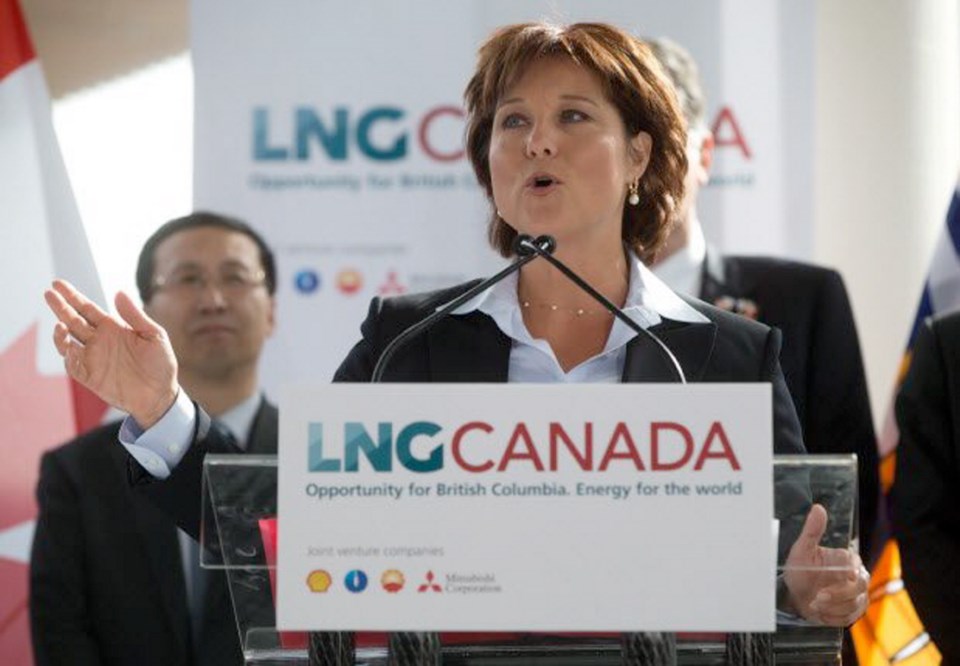 Liquefied natural gas proponents will be trying to grind the government down on costs even after the B.C. legislature passes the keystone project development agreement designed to accommodate them.
Liquefied natural gas proponents will be trying to grind the government down on costs even after the B.C. legislature passes the keystone project development agreement designed to accommodate them.
Finance Minister Mike de Jong said the government’s position is fixed and unlikely to change. But the industry feels government still has more to do on specific tax and labour issues to make the LNG-export vision happen.
As politicians debated the agreement this week, LNG Alliance president David Keane told reporters: “I think the government has more to do.
“We still have some work to do to make sure we’re globally competitive.”
Government and the industry are in detailed negotiations on how many jobs would need to be filled and how they’re going to go about training British Columbians to do them.
But Keane also noted: “There are things that can be done on some of the taxes, like the provincial sales tax.”
An LNG plant like the one that’s the subject of the first project-development agreement would pay hundreds of millions in PST. But a change in the designation of the facility, as far as tax law is concerned, could erase that cost.
The industry might push on that front; however, de Jong all but ruled out any PST changes. “I would not look for significant changes going forward.”
He said it’s natural for the industry to advocate for changes and “that will continue long into the future.”
But the government has settled on an overall package that strikes the right balance, he said.
While the Opposition spent the week questioning why the industry is entitled to 25 years of certainty that specific taxes and government costs won’t be raised, Keane stressed B.C. is the only jurisdiction that’s charging such costs in the first place.
“This is the only one with a special LNG tax, the only one with a carbon tax,” he said.
The industry will also have to buy carbon offsets to meet emission targets that are lower than anywhere else in the world.
“We don’t look at that like it’s a big giveaway by the government,” Keane said. “In places where we operate, we don’t have those taxes.”
The industry’s stance is that B.C. has advantages over other gas-producing regions around the world, but is a high-cost environment because of terrain, pipeline distances, wages and taxes. That negotiating position convinced the federal and provincial governments to cut taxes for the early stages of development.
The industry’s demand for long-term certainty on rates prompted B.C. to offer the indemnity deal against any hikes by future governments. That’s the main feature of the agreement that will pass the legislature next week.
It looked to be the government’s final offer before Pacific NorthWest LNG makes the final investment decision. But Keane’s comments show the dickering will continue right up to the final investment decision, and beyond.
The Opposition also criticized the projected greenhouse-gas emissions, saying B.C. can’t possibly meet legislated reduction targets if the industry takes off.
But Keane said the industry has agreed to standards that will cost millions in technology and offsets.
“I don’t think it’s all on the back of LNG,” he said. “There’s lots of economic growth, GHG emissions are increasing. I’m not sure you could meet that [target] even without LNG.”
The potential for temporary foreign workers was also criticized. NDP Leader John Horgan said: “Temporary foreign workers are not a path to citizenship. It’s a return ticket home if the boss doesn’t like you. It’s sub-average wages and working conditions that have been exposed in this place over the past decade.”
There are no local-hire commitments in the agreement, but Keane said the company has repeatedly promised a B.C.-Canadian first approach, partly because TFWs involve extra costs.
Foreign workers are a virtual certainty if the industry takes off, partly because of the size of the workforce needed, partly because some specialized jobs can’t be filled in B.C.
The industry is getting the protection from cost hikes that it needs. But it’s still keen to drive costs down lower before the final commitment to build.



